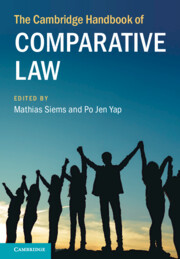Book contents
- The Cambridge Handbook of Comparative Law
- The Cambridge Handbook of Comparative Law
- Copyright page
- Contents
- Figures
- Tables
- Contributors
- Preface
- Abbreviations
- 1 Introduction
- Part I Methods of Comparative Law
- 2 Traditional Methods
- 3 Historical-Jurisprudential Methods
- 4 Critical Methods
- 5 Culture and Comparative Law Methodology
- 6 Linguistic Approaches
- 7 Qualitative Fieldwork
- 8 New Institutional Economics
- 9 Empirical Methods
- 10 Machine-Learning Methods
- Part II Legal Families and Geographical Comparisons
- Part III Central Themes in Comparative Law
- Part IV Comparative Law beyond the State
- Index
2 - Traditional Methods
from Part I - Methods of Comparative Law
Published online by Cambridge University Press: 26 January 2024
- The Cambridge Handbook of Comparative Law
- The Cambridge Handbook of Comparative Law
- Copyright page
- Contents
- Figures
- Tables
- Contributors
- Preface
- Abbreviations
- 1 Introduction
- Part I Methods of Comparative Law
- 2 Traditional Methods
- 3 Historical-Jurisprudential Methods
- 4 Critical Methods
- 5 Culture and Comparative Law Methodology
- 6 Linguistic Approaches
- 7 Qualitative Fieldwork
- 8 New Institutional Economics
- 9 Empirical Methods
- 10 Machine-Learning Methods
- Part II Legal Families and Geographical Comparisons
- Part III Central Themes in Comparative Law
- Part IV Comparative Law beyond the State
- Index
Summary
Comparative law has grown out of its traditional theoretical and methodological boundaries. However, much of comparative law scholarship may still be described as traditional. This chapter discusses the traditional view of comparative law research. What can be characterised as traditional comparative law has concentrated on the private law of major Western legal systems, leaving other areas of law and non-Western systems mostly aside. In substance, while it is not entirely clear what can be labelled as traditional methods, we can separate three essential issues. The first issue concerns the research process and how traditional comparative law scholars have outlined it. Traditional comparative law scholarship typically provides guidance on how research should be conducted. The second issue deals with the specific method of functionalism that has been recommended to be used in the comparative research. At the heart of the functionalist methodology lies the assumption according to which there are legal rules or institutions that serve a certain social function. The third issue concerns the underlying assumption behind functionalism, that is universalism. Universalism maintains that every society faces essentially the same problems, and that societies solve these problems by different means, though often with similar results. The chapter ends with a critical analysis and thoughts about the future of traditional methods.
Keywords
- Type
- Chapter
- Information
- The Cambridge Handbook of Comparative Law , pp. 15 - 31Publisher: Cambridge University PressPrint publication year: 2024
- 1
- Cited by

